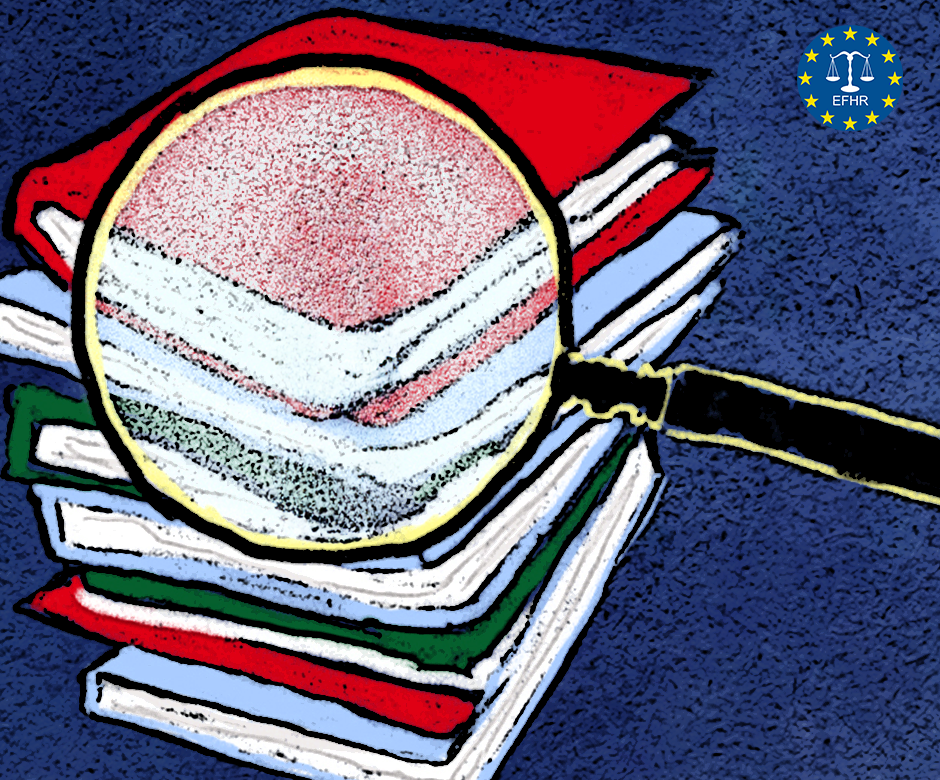- 2022/02/04
A victory secured by the EFHR – the Court ruled that surnames could be registered in their original form using a character with the diacritical mark “ń”

The District Court of the City of Vilnius issued a decision on January 27, in which it obliged the Vilnius Civil Registry Office to change the surname of a citizen of the Republic of Lithuania from “Mulerskaitė-Vaczynska” to its original form – “Mulerskaitė-Waczyńska”, and issue a new marriage certificate.
In the present case it was established that in 2018 in Lithuania the applicant married a Polish citizen T. A. Waczyński. The spouses currently live and work in Poland. In this case, the applicant requested that her surname be written in its original form with the letter “W” and the diacritical mark “ń”, i.e. in the form used by her husband. His original surname contains two letters that do not appear in Lithuanian language, therefore the correct spelling of such surname is not possible according to the current legal regulations in Lithuania.According to the new Act on the spelling of names and surnames, from May 1, the letter “w” will be allowed in the documents of Lithuanian citizens, but the issue of using non-Lithuanian letters with diacritical marks in documents has been postponed to the future.
An important aspect is the fact that the State Commission for the Lithuanian Language issued an opinion on the matter, stating that although the Lithuanian language does not have the letters “w” and “ń” and therefore they are replaced by “v” and “n”, it is an admissible exception, taking into account the needs of society. This applies when the citizens of the Republic of Lithuania marry the citizens of a foreign country and take their surnames.
The European Foundation of Human Rights (EFHR), which provided the applicant with due legal assistance in the discussed case, rejoices the fact that in practice, the decision of the District Court of the City of Vilnius reflects the position of the Lithuanian Supreme Court regarding the writing of diacritical marks in civil status documents. We remind you that on the 6 th of October, 2021, the Lithuanian Supreme Court adopted a ruling stating that the analysis of the legal rules of law does not provide ground to conclude that any diacritical mark, which is not utilized in the Lithuanian alphabet, should automatically be considered as a mark that is technically impossible to write.
The Court of Justice of the European Union stated in its judgments (see judgment of 2 October 2003 in case C-148/02 Garcia Avello; judgment of 22 December 2010 in case C-208/09 Sayn-Wittgenstein, C -208/09; judgment of 12 May 2011 in case C-391/09 Runevič-Vardyn and Wardyn) that a difference in spelling of the same surname for two people of the same married couple could cause serious inconvenience to the parties, both in the public and private sphere. Discrepancies in the spelling of the surname may raise doubts as to the identity of persons, the authenticity of the documents presented or the authenticity of the data contained therein. If this is the case, it means a restriction of the right granted by article 21 of the Treaty on the Functioning of the European Union (“TFEU”), which guarantees the right to move and reside freely within the territory of the Member States. A restriction on the freedoms granted by Article 21 TFEU, resulting from the serious disadvantages described above, can be justified if it is based on objective considerations and is proportionate to the legitimate objective pursued (see judgment of 14 October 2008 in case C-353/06 Grunkin and Paul). Consequently, it could be considered as a restriction of the rights granted by Article 21 TFEU if the different spelling of family members’ surnames would cause serious administrative, professional or personal inconveniences.
The Court adjudicating in the case concluded that the spelling of the applicant’s surname, Mulerskaitė-Waczyńska differently from that of her spouse, undoubtedly causes some administrative, personal and professional inconveniences for the spouses in terms of establishing the identity of all family members, the authenticity of personal documents, confirmation of family correlations, etc. In this case, not deviating from the existing legal framework and denying the request would not be inequitable, as recording her name and the name of her spouse in a different manner would cause inconvenient consequences for the applicant (refusal to change the applicant’s name may lead to inconvenience in the future in the event of possible problems with birth of children, registration of their birth, settlement of property acquired within the joint ownership and / or difficulties with inheritance).
The Court additionally released a statement that it has not been established as yet that the utilization of non-Lithuanian letters in names and surnames could affect the rules on the use of the official language in such an adverse manner so that the public interest would be harmed. It should be noted that in its conclusion, the State Commission of the Lithuanian language declared that some exceptions can be made with the writing of non-Lithuanian letters in a surname, one of them being the citizens of the Republic of Lithuania who marry foreigners and take their surnames.
This decision is highly significant for the EFHR, because this is the first case in the practice of our organization when the applicant’s right to have their surname written in its original form with a non-Lithuanian character (a consonant with the diacritical mark “ń”) in official documents, has been approved by the Court.
The EFHR recalls that back in 2007 it was noted by the European Court of Human Rights in Johansson against Finland that if such names have already been registered in the population register and the preservation of cultural, linguistic identity has not been affected adversely, there is no good reason to deny the registration of such a name (or, as in this case, a surname).That being the case, our organization hopes to come to positive decisions on the use of diacritical marks in personal names continuously. All the more, because the applicants and their families suffer from great inconveniences caused by the refusal to change their surnames, which contain non-Lithuanian characters with diacritical marks.
/Translated by Monika Ivanavičiūtė within the framework of a traineeship programme of the European Foundation of Human Rights/



